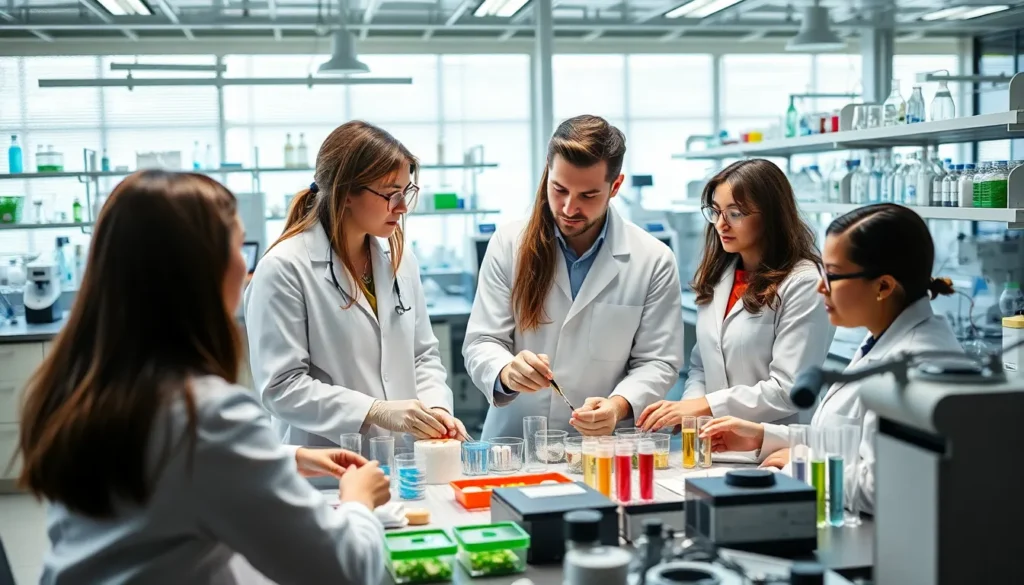Table of Contents
ToggleBiotechnology research stands at the forefront of scientific innovation, merging biology with technology to tackle some of the world’s most pressing challenges. From healthcare advancements to sustainable agriculture, this dynamic field offers solutions that can transform lives and ecosystems alike. As researchers delve deeper into genetic engineering, synthetic biology, and biomanufacturing, they unlock the potential to create groundbreaking therapies and environmentally friendly products.
The impact of biotechnology research extends beyond laboratories. It reshapes industries and fosters economic growth while addressing global issues like food security and disease management. With rapid advancements and increasing investment, the future of biotechnology holds exciting possibilities that could redefine the way society interacts with nature and technology.
Overview of Biotechnology Research
Biotechnology research integrates biological sciences with technology to solve pressing global challenges. It includes various fields like genetic engineering, synthetic biology, and biomanufacturing, which lead to groundbreaking therapies and environmentally sustainable products.
Biotechnology research focuses on manipulating living organisms or their components to develop new processes and products. For instance, genetic engineering uses tools like CRISPR to modify organisms for improved agricultural yields. Synthetic biology designs and constructs new biological parts, providing innovative solutions for issues such as disease resistance and biofuels.
The impact of biotechnology research extends to diverse industries, including healthcare, agriculture, and pharmaceuticals. Health-related innovations like personalized medicine emerge from biotechnological advancements, enhancing treatment efficacy. In agriculture, biotechnology promotes sustainable practices through the development of genetically modified organisms (GMOs) that can withstand pests and environmental stresses.
Economic growth is another outcome of biotechnology research. Investment in this field fosters job creation in various sectors, stimulating local economies. Furthermore, addressing food security and disease management through biotechnology has significant social implications, making technology accessible to more people.
Advancements in biotechnology research contribute to transformative shifts in society’s relationship with natural resources and technological applications. Continued investment and innovation in this domain indicate a promising future for sustainable development and improved quality of life globally.
Key Areas of Biotechnology Research

Biotechnology research encompasses several critical areas that address global challenges in agriculture, medicine, and the environment. Each of these sectors benefits from innovative approaches and technologies that enhance productivity, health, and sustainability.
Agricultural Biotechnology
Agricultural biotechnology focuses on improving crop yields, disease resistance, and environmental adaptability. Techniques such as genetic engineering and marker-assisted selection enhance traits in various crops, leading to increased food production. Genetically modified organisms (GMOs) play a significant role in this sector by providing pest and herbicide resistance, reducing reliance on chemical inputs. Integrated pest management and biofortification are essential strategies fostering sustainable agricultural practices. Research continues to explore plant-derived pharmaceuticals and the development of drought-resistant variants, which address food security concerns amid climate challenges.
Medical Biotechnology
Medical biotechnology aims to develop effective diagnostics, treatments, and preventive measures for various diseases. It leverages molecular biology and genomics to create targeted therapies and personalized medicine. Advances in gene therapy and monoclonal antibodies revolutionize cancer treatment and rare disease management. Furthermore, vaccine development proceeds rapidly, focusing on technologies like mRNA to enhance immune responses against infectious diseases. Biomanufacturing of therapeutic proteins and biopharmaceuticals facilitates the production of essential medications, optimizing patient care and delivery of healthcare services.
Environmental Biotechnology
Environmental biotechnology investigates solutions for pollution control, waste management, and sustainable energy production. Bioremediation utilizes microorganisms to detoxify contaminated environments, effectively restoring ecosystems. Waste treatment technologies, such as anaerobic digestion, convert organic waste into bioenergy, promoting resource recovery. Research in biofuels also emphasizes sustainable alternatives to fossil fuels, leveraging biomass and algae. This field supports circular economy principles by developing eco-friendly processes that minimize impacts on natural resources, contributing to overall environmental sustainability.
Techniques Used in Biotechnology Research
Biotechnology research employs various advanced techniques that enhance scientific understanding and facilitate practical applications. These methods play crucial roles in genetics, molecular biology, and data analysis.
Genetic Engineering
Genetic engineering involves altering an organism’s DNA to achieve desired traits. This technique allows scientists to introduce, remove, or modify genetic material in various organisms. Methods such as transformation, transfection, and electroporation are commonly used to transfer recombinant DNA into host cells. Applications of genetic engineering include developing genetically modified organisms (GMOs) with improved yield or resistance to pathogens, and creating crops that withstand environmental stressors. Gene editing enhances precision in genetic responses, making it a cornerstone in modern agriculture and medicine.
CRISPR Technology
CRISPR technology revolutionizes genetic editing by offering a precise, cost-effective, and efficient means to modify DNA. CRISPR-Cas9, the most widely used system, employs a guide RNA to direct the Cas9 enzyme to specific DNA sequences, allowing targeted modifications. This technology facilitates advancements in creating disease-resistant plants and tailored therapies for genetic disorders in humans. CRISPR’s ability to edit genomes with high accuracy accelerates research in therapeutic development, synthetic biology, and other areas, establishing it as a pivotal tool in biotechnology.
Bioinformatics
Bioinformatics combines biology, computer science, and mathematics to analyze biological data. This technique plays a critical role in managing and interpreting vast amounts of information generated from genomic and proteomic studies. Algorithms and software tools enable the identification of patterns and relationships within complex datasets, aiding in tasks like gene sequencing, protein structure prediction, and evolutionary analysis. Bioinformatics accelerates discoveries in drug design and personalized medicine, offering insights into the genetic basis of diseases and enabling targeted treatments.
Challenges in Biotechnology Research
Biotechnology research faces several challenges that can impede progress and innovation. These challenges include ethical considerations and regulatory issues that researchers must navigate to ensure safety, efficacy, and public trust.
Ethical Considerations
Ethical considerations play a crucial role in biotechnology research, particularly regarding genetic engineering and synthetic biology. Concerns arise over the potential consequences of manipulating living organisms, including unintended ecological impacts and ethical dilemmas surrounding gene editing in humans. Researchers must address questions regarding consent, ownership of genetic material, and the implications of creating genetically modified organisms (GMOs). Organizations and regulatory bodies actively work to develop guidelines that uphold ethical standards while allowing for scientific advancement, ensuring that biotechnology benefits humanity without compromising moral values.
Regulatory Issues
Regulatory issues significantly influence biotechnology research and its application. Different countries impose varying regulations on GMOs, gene therapies, and biomanufactured products, creating challenges for researchers seeking to transfer technology across borders. Compliance with stringent safety assessments and liability measures can slow research progress. Additionally, processes for obtaining approvals can delay the introduction of innovative therapies and products to the market. Researchers must understand the legal landscape in which they operate to effectively navigate these complex regulations, balancing innovation with compliance to foster public confidence in biotechnological advancements.
Future Trends in Biotechnology Research
Biotechnology research is evolving rapidly, driven by advancements in technology and growing global challenges. Emerging trends in this field include:
- Gene Editing Innovations
Techniques like CRISPR continue to advance, providing opportunities for precise genetic modifications. Researchers focus on expanding CRISPR applications in agriculture and medicine, targeting specific genes for enhanced crop traits and personalized treatments.
- Synthetic Biology Expansion
The integration of engineering principles in biology leads to synthetic biology’s growth. Researchers design and construct new biological parts and systems, paving the way for innovative solutions in drug production and bio-based materials.
- Microbiome Research
Studying the human microbiome and its influence on health gains momentum. Researchers aim to understand how gut bacteria impact diseases, leading to personalized microbiome therapies and probiotics for improved health outcomes.
- Personalized Medicine Development
Advances in genomics facilitate the creation of tailored therapies. Researchers leverage genetic information to develop personalized treatment plans, enhancing the effectiveness of medications and reducing adverse effects.
- Sustainable Practices in Agriculture
Biotechnology aims to develop sustainable agricultural practices. Researchers create crops that require fewer resources, such as water and fertilizers, aligning with environmental conservation goals.
- Biomanufacturing Innovations
Biomanufacturing technology improves production efficiency for pharmaceuticals and biofuels. Researchers apply biotechnological processes to create sustainable products, reducing reliance on traditional manufacturing methods.
- Artificial Intelligence in Biotechnology
The integration of AI in biotechnology research enhances data analysis and accelerates discovery. Researchers employ machine learning algorithms to predict outcomes and optimize processes, ultimately improving research efficiency.
- Regenerative Medicine Advancements
Stem cell research and tissue engineering show potential in regenerative medicine. Researchers explore ways to repair or replace damaged tissues and organs, contributing to breakthroughs in treatment for various ailments.
- Ethical Framework Development
As biotechnology evolves, establishing ethical frameworks becomes critical. Researchers work on guidelines to address concerns related to genetic manipulation and ensure responsible practices in research and application.
- Global Collaborations
Increased global collaboration among researchers and institutions fosters knowledge sharing. Partnerships aim to address global health challenges and enhance the impact of biotechnology research across borders.
These trends demonstrate the dynamic nature of biotechnology research and its potential to address significant challenges while promoting sustainable development and health advancements.
Biotechnology research stands at the forefront of innovation addressing some of the world’s most pressing challenges. Its ability to enhance healthcare and promote sustainable agricultural practices demonstrates the transformative power of merging biology with technology. As advancements continue in genetic engineering and synthetic biology, the potential for creating effective therapies and eco-friendly solutions grows significantly.
Navigating ethical and regulatory landscapes remains crucial for responsible progress. Future trends indicate a promising trajectory for biotechnology, with increased collaboration and the integration of artificial intelligence driving discoveries. This field not only fosters economic growth but also contributes to a healthier and more sustainable world. As researchers push boundaries, the impact of biotechnology will resonate across various sectors, ultimately improving lives globally.







